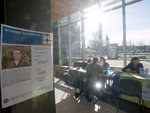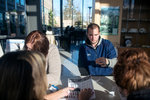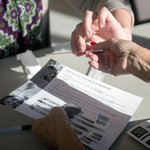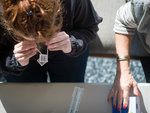




Staff and students at Centralia College came together in honor of one of their own on Tuesday, hosting a bone marrow drive for Edward Riley, the social media coordinator for the college.
Riley was diagnosed with myelodysplastic syndromes, otherwise known as MDS, an aggressive form of cancer that affects the bone marrow and blood. The disease is similar to leukemia.
In all, 28 people signed up to join the bone marrow registry, a number Tanya Nobles, a donor recruitment representative for Puget Sound Blood Center, said was a good number.
“When we hold these drives, we are really holding them in honor of the patient,” she said. “The actual likelihood to find a match for Ed, here, today in this pool is very, very, very tiny.”
Although Riley may not find a donor match at the drive, Nobles said the drive will help provide donors for other patients throughout the nation.
“When you hold these drives in honor of a patient, we are hoping that one of these donors will be a match for someone else,” Nobles said. “We are having these types of drives all over the country every day. That is what supplies us with available donors for patients everywhere.”
Riley attended the drive in the morning, and later went for a blood transfusion at Providence Centralia Hospital. The blood transfusions typically last eight hours, and he said he now has to do the transfusions more frequently.
“It means in one sense that chemotherapy is working,” Riley said. “My white cells and my platelets have stabilized but my red blood cells, I’m having to get transfusions quicker.”
He is currently undergoing light chemotherapy in hopes of putting his cancer into remission, which would increase the overall success rate of the bone marrow transplant. Riley is currently in his third cycle and said if the treatment is not successful, he will have to undergo heavier chemotherapy. He hopes he will be able to start the transplant process sometime in the spring where he will have to go to Seattle to start two weeks of heavy doses of chemotherapy beforehand.
The process will “kill” Riley’s entire immune system as well as his bone marrow. From there he would receive someone else’s bone marrow through blood.
“I’ll just get blood and wait for that to grow and build up,” he said. “It’s going to be a boy in the bubble type of thing.”
Nobles said the process of collecting bone marrow is not a painful one. Seventy-five percent of the time a procedure similar to platelet plasma donation would be used. The donor, which is carefully matched through DNA, would have to participate in four days of daily injections of a hormone that causes the body to overproduce stem cells and release them into the bloodstream. The donor would then be hooked up to a machine and the blood would be pulled out of one arm, circulate through a machine that filters out the stem cells and the blood would be returned to the donor through the other arm.
The other 25 percent of the time, an outpatient surgical procedure would have to be completed. The two-hour procedure is done under general anesthesia and the marrow is extracted from the pelvic bone with a needle. Although the donor would not feel the process, Nobles said, often times he or she will experience bruising and a recovery time of two to three days.
The process of finding a donor is a long one and even when one is found, Riley said, 20 percent do not survive the treatment. Afterward there is a 50/50 chance of the body accepting the new marrow.
Riley remains hopeful, although the process has been a big change for him to accept.
As a former student of Centralia College and an author of a children’s book, Riley transferred to Evergreen State College in Olympia. He has been on staff at Centralia College for one year and was just 35 credits shy of graduating from Evergreen when he had to stop attending classes for his treatment.
He went from participating on a variety of different organizations for a number of different causes to sitting in a hospital bed for his transfusions. The process makes him weak, but he said he is learning to adapt.
“It’s frustrating. I’m trying to have to learn patience; making all sorts of adjustments depending on where my blood levels are at, depending on if I’m getting chemo,” he explained.
Throughout the process he has seen the community help him in unimaginable ways.
“The people have been wonderful. You really find out who your friends are and that sort of thing,” Riley said. “It’s the one thing that when I moved here amazed me is how the community comes together for causes and things….The community in this whole area just really comes together and to have them do something like this for me is really amazing. It just chokes me up.”
Those who came to help said they couldn’t imagine helping anyone more deserving. Riley’s former teacher, Linda Foss, who is the English Department Chairwoman, said she was proud of the things Riley had done and said she wanted to help him during his fight.
“(I’m here) to support Ed and his fight because he is a very talented and community-orientated person himself,” Foss said. “It’s just like if it was anyone else he would be the one sitting here and I just really respect him as a person and the work I think that he still has to do here.”